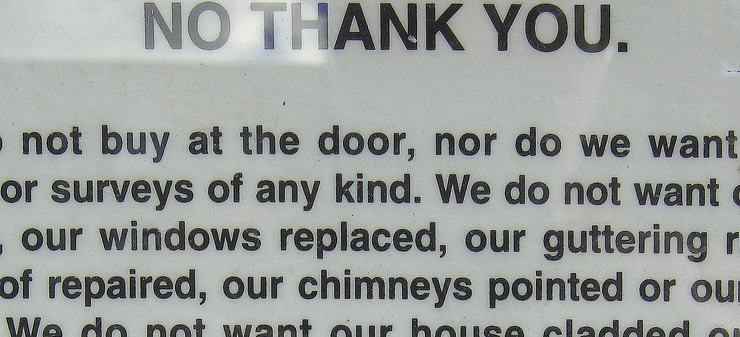Behind the closed door
Door-to-door charity is no walk in the park, according to Daniel Cope…
If you are anything like me then you will have dived headfirst into the summer with twinges of panic toward how you might fill your time. I told myself that I had to do “something productive”. I like to have some kind of purpose for the day rather than getting up at noon and aimlessly watching several repeats of F.R.I.E.N.D.S –well at least not every day! So this summer I decided to work as a charity door-to-door fundraiser and what follows will be a summary of the good, the bad and the plain ol’ ugly of such a profession.
It is not exactly the occupation that relatives respond to with the greatest amount of warmth: needless to say that my parents weren’t jumping on rooftops at the idea of me wandering the streets and knocking on strangers doors. Well I can’t say I blamed them. We live in, and have done for quite some time, a culture of suspicion. I might be a university student that comes from what I consider to be a liberal background but I’d be a liar if I said I didn’t hold some trepidation about the potential characters I might meet in certain demographic areas.
The fundamental ethos of the job is wonderful since you are trying to raise both support and awareness for some really brilliant charities and I was working for the great Anthony Nolan. However, as an employee it boils down to one very simple fact, you have to make sales otherwise you are let go. As such, I went into the job fearing I would be posted to a low-income area that wouldn’t donate and this would mean no help for the charity and me losing a job before I’d even got my feet under (the non-existent) desk. The pressure was on.
Whilst I sat on the bus with my team as we journeyed to the location I would be working in, on my very first day, I thought to myself; “why don’t we just go to middle class demographics?” Surely if you look at it a very base, sales point of view, then to go to areas that statistically have more money will only better profit the charity? I hate the way the class system is stratified as it is anyway but trying to look at it from a pragmatically business-like perspective I imagined this was how the game was played. Not so apparently. I quickly learned, having achieved some sign ups in low-income high-rise flats that the trend I imagined was very misguided.
Now comparably, middle-class responses would often vary from “I already donate to charities” to “the dinners cooking”. Both of which may be perfectly legitimate excuses but I have knocked on well-over a thousand doors in the West Midlands and I now have one big bug-bear. “I’m not interested mate/ Nah, I’m alright thanks mate” or variations thereof really annoy me. This is because I usually hadn’t even had the chance to open my mouth to announce who I was and why I was there. If you’ve listened to my introduction and you don’t think it is something you want to help and get behind then fine but just politely decline me, you are doing me a favour then – after all there are more doors to get to! But at least listen to the introduction! When people said “Nah, I’m alright thanks mate” before they had heard anything, I’d bite back the urge to reply “yeah but the people who need our help aren’t!” I suppose that’s petty really because it is that individuals home and whatever way you look at it, I am intruding on their time. But is common courteousness really so much to ask for?
So where is this rambling diatribe going then? Fact is, the more often I met with rude or unreceptive exchanges from people at the doors the more bitter I became. Despite the fact I had spoken to some truly inspirational people, who passionately believed in the cause and those who knew blood cancer sufferers or were sufferers themselves, these people weren’t coming along fast enough. The negative seemed to outweigh the positive and I began to even think to myself that such people were representative of all British people. Which is nonsense of course but since I felt my own views were beginning to be compromised I knew quite quickly that I wouldn’t continue with this job for very long.
I would ask myself if ‘middle-class’ people who were seemingly comfortable in their own daily lives were losing sight of the need to help others who require it? The trend I seemed to find was that if people weren’t so well-off themselves then their empathy was much more prevalent. I’m certainly not saying this is gospel (this is just one experience, in one small-part of the West Midlands) but I do think there is something to be said for how often some of us take for granted the graces we have in life. Now whilst, the job wasn’t one for me, it gave me an even greater appreciation for charitable institutions. I guess learning the statistics and case studies about certain charities made the plights of individuals much more tangible for me. Most importantly I realised that our efforts DO make that difference.
Now it isn’t for everyone and it definitely wasn’t for me. After three weeks I eventually left on my own terms, rather than being sacked, since there was something of a dry-spell in the sign-ups I was getting toward the end of my probation tenure. I didn’t walk away without gaining something though. I’d assessed and reassessed aspects of social attitudes towards economy and charity and also (hopefully) made a difference to those awaiting bone marrow transplants. That is something.

Comments